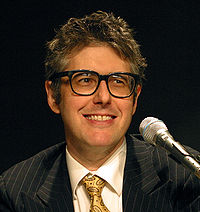I didn’t have Christmas growing up, so I never got what was funny about leg lamps. I never sang “Jingle Bells” unironically or even saw It’s a Wonderful Life. Over the years, mostly from pop culture parodies, I’ve picked up the salient bits: small-town family, bad bankers, wise angels, rash decision reversed, and voila! Happily ever after. That understanding in no way prepared me for my first real Christmas, which I celebrated with my Russian-Jewish father-in-law, his Italian-American wife, her brother the priest, and the priest’s surprise.
As a child, I was an outsider when the whole country went Christmas crazy. I had only Hannukah, which is like a kid playing a kazoo on the sidelines while a marching band in full regalia, with cheerleaders and baton twirlers and gymnasts and everything, spends a month slowly parading by. Then, I got older, and the meaning of Christmas evolved—it became the time I got laid off. Twice, including once during the Great New York Transit Strike of 2005. Even for someone who doesn’t celebrate the baby Jesus, that’s pretty harsh.
My first real Christmas on the inside made all the difference. Suddenly I understood. We go nuts for four to six weeks in advance of this holiday because it’s terrifying. 24 hours with our families where we’re expected to be kinder, gentler, more charitable versions of our screwed up selves? Where we have to open boxes of things we never wanted in front of everyone and pretend to be excited, while nervously watching everyone else open the presents we got them to see if they’re sufficiently appreciative? Where we have several meals with extended family members and in-laws, who take a long looks at us and comment on whether we’re more or less skinny than before? Those stakes are high.
Mr. Ben, my husband, is also Jewish, but unlike me, he grew up with mistletoe and ornaments. His father brought the tradition over from Russia when he emigrated; there, under Communism, it was a Secular Mandatory Fun Day, with the part of Big Brother played by the ominous-sounding Father Snow. (Particularly ominous if you’ve read Game of Thrones.)
Once we were living together and engaged, Mr. Ben asked me to come to Christmas. For reasons of principle, I was hard to convince, but finally, like anyone who’s ever been in a lasting relationship, I caved. Mr. Ben’s dad’s second wife, Carla, was Italian and an excellent cook; she also had a reputation for giving such good presents that all the Hunger Games-level agony of Christmas shopping became retroactively worth it. Between a bounty of material goods and Martha Stewart-type treats, I figured the holiday would be painless, maybe even kind of fun.
Carla had invited her brother Ned, a 50-year-old Catholic priest, as well as their aged old-world Italian mother. Shortly before he arrived, Ned told Carla that he would be accompanied by his friend, Winston.
Ned went to seminary at 18. He had never so much had dated a girl; from childhood, his vocation was clear. That is partly why Ned’s mother, always so proud of her son the priest, looked confused to be introduced to Winston, a very nice middle-aged Asian-American man. Mr. Ben’s Russian grandmother sat next to her on the couch across from the fireplace, perhaps thinking that the fact that her own son had re-married a shiksa now seemed not so bad. Winston and Ned, oblivious, glowed happily next to each other on the piano bench.
Still: Christmas! A brightly-lit, colorfully-decorated tree presided over an avalanche of boxes and bags. Delicious smells wafted from the kitchen, where Carla, tongue-tied with awkwardness, had escaped to tend to the meal.
“Let’s play a duet!” Ned suggested.
“Great!” replied Winston.
Being that this was my first real Christmas, I had no idea whether any of this was normal. Maybe Catholic priests always used Christmas with their Russian-Jewish extended families to come out to their horrified, blindsided mothers, one piano duet at a time. Or maybe Winston was really just a friend and we were all over-reacting.
As we began to exchange presents en masse, that hope faded. “For you!” said Ned.
“Thank you!” cried Winston, opening a box of two button-down shirts: one bright purple, the other bright pink. “And that one’s for you.”
Ned picked up the flat package and ripped it open. “Oh my gosh!” he said. “You didn’t!”
Ned showed us the present he had just received, and I choked on my Diet Coke. It was a framed, signed poster of “Will and Grace.”

The next morning, Ned’s mother and Carla appeared dressed and ready for church. Ned and Winston came out of the guest room dressed and ready to go antiquing. It was at this point that Ned’s mother’s heart fell to the hardwood floor like a big red shiny ornament and smashed into a million pieces. We could all hear it except for Ned, who, with Winston, went on his merry way. And at last, Christmas was over.
Ned and Winston now live together in a wonderful old house in Amish country with two pianos and lots of knickknacks. Ned is no longer a priest. I don’t know if he ever officially came out to the family or whether he figures that, after the “Will and Grace” poster, it would be redundant, but he has reconciled with his mother, who is very fond of Winston. And I have learned that while Thanksgiving may be a big deal for drama, Christmas totally takes the (fruit)cake.

 Currently, Fifty Shades of Grey—an Australian e-book by an unknown female author with no marketing budget—is fourth on USA Today’s Best-Selling Books list, behind only the “Hunger Games” trilogy. Grey’s two sequels, Fifty Shades Darker and Fifty Shades Free, have also climbed into the Top 20. And panic is gripping the nation, because these books, which are being enjoyed by The Ladies, are about The Sex.
Currently, Fifty Shades of Grey—an Australian e-book by an unknown female author with no marketing budget—is fourth on USA Today’s Best-Selling Books list, behind only the “Hunger Games” trilogy. Grey’s two sequels, Fifty Shades Darker and Fifty Shades Free, have also climbed into the Top 20. And panic is gripping the nation, because these books, which are being enjoyed by The Ladies, are about The Sex.







